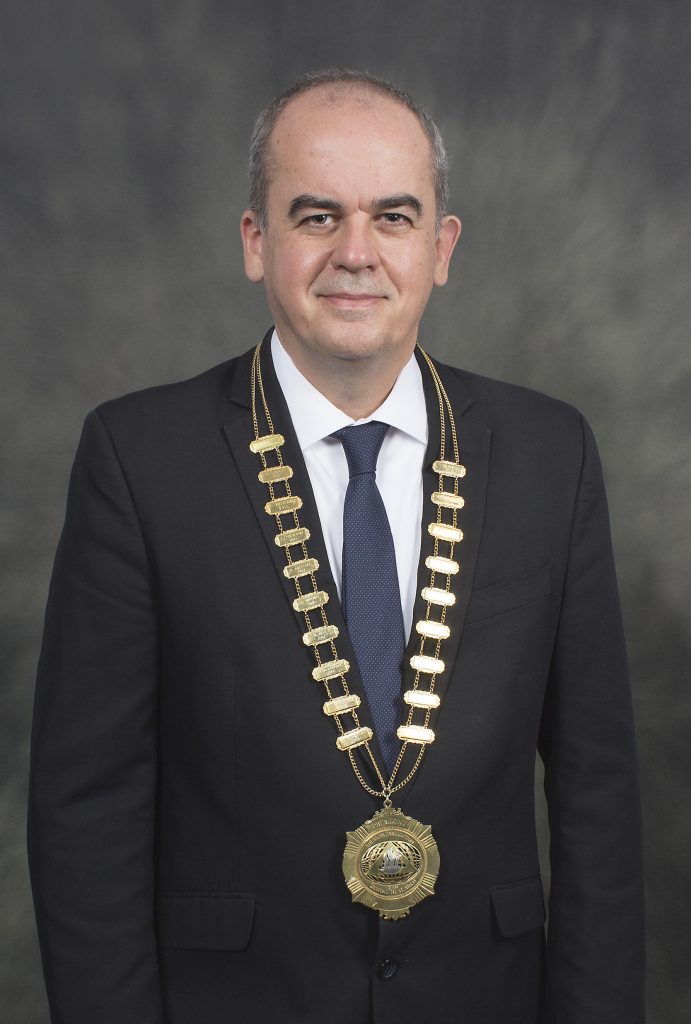Jacques Nör begins presidency of national dental, oral and craniofacial research organization5 min read
Ann Arbor, Mich., Tuesday, July 27, 2021 – School of Dentistry faculty member Dr. Jacques Nör is the new leader of the American Association for Dental Research (AADR) after the organization’s annual meeting concluded last weekend.

As president for 2021-22, Nör will lead the organization as it adopts a new name in its 50th year. To better reflect the broad reach of research developed by its members and presented at its meetings, the organization is expanding its name to the American Association of Dental, Oral and Craniofacial Research, or AADOCR.
With 3,100 members across the country, it is the largest division of the International Association for Dental Research (IADR). Last week’s virtual conference, from July 21-24, is the annual joint meeting of the IADR, AADOCR and the Canadian Association for Dental Research. It was attended by more than 3,500 participants around the world.
Nör is the Donald A. Kerr Collegiate Professor of Dentistry and chair of the Department of Cariology, Restorative Sciences and Endodontics. He is also a professor of Otolaryngology at the U-M School of Medicine and a professor of Biomedical Engineering at the U-M College of Engineering.
In his president’s speech at the opening ceremony of the annual meeting Wednesday evening, Nör cited the leadership philosophy of “Servant Leadership” that was popularized by Robert Greenleaf, an AT&T administrator who became an author and thought leader in the realm of organizational management in the 1960s and ‘70s. The concept advocates that leaders should focus on the growth and well-being of people and the communities to which they belong, in effect becoming servants to the organization, its members and their needs, which in turn strengthens the organization. “A successful organization understands that the leadership is at the service of its members, not the other way around,” Nör said. “Focus on service starts with an open, two-way dialogue between members and leadership.”
Within that context, Nör noted that the AADR began an organizational reassessment as it approached its 50th year. It promoted a dialogue with its members and performed membership surveys. “It became clear that to fulfill our expanding mission, we should re-think how we could better serve a dynamic, diverse and interdisciplinary mix of researchers in the 2020 decade and beyond,” Nör said. “As a result, the AADR developed a strategic vision that was named Science First that proposes to expand the spectrum of our membership by developing initiatives that enhance the breadth and depth of the science presented in our meetings and published in our journals.” The name change is part of the reassessment, designed to represent the full spectrum of the members’ scientific research.
“A successful organization is strategic and constantly looks at ways to improve the services provided to its members,” Nör said. “As research is data-driven, decisions made by the Association should also be informed by robust data and unbiased interpretation of results. Intentional collection of data reflecting membership trends and needs should provide the rationale for initiatives that enhance the service and the value of the Association.”
Nör lamented the tragic suffering and loss of life because of the COVID-19 pandemic over the last year and a half, but noted the scientific advances that resulted through the efforts of organizations such as AADR and the National Institute of Dental and Craniofacial Research. Coronavirus research, development of vaccines and shared advances in safe care for patients and providers in dental clinics were some of the successes in the midst of the pandemic. “Through online seminars, symposia and publications in our journals and websites, the AADR is serving its members by providing the most updated information on COVID,” Nör said. “When science finally eliminates the COVID threat, and life becomes ‘normal’ again, we will have learned a lot from these challenging times. So, I firmly believe that the future is bright!”
Nör serves as an Associate Editor of the IADR’s Journal of Dental Research and has participated on numerous IADR and AADR committees. He was selected as an AADR Fellow in 2017 and was winner of the 2012 Distinguished Scientist Award. He received the 2010 and 2011 William J. Gies Award, Biological, and won first place in the both the IADR and AADR Edward H. Hatton Award, Postdoctoral Category, in 1999.
He received his DDS from the Brazilian Federal University, Porto Alegre, Brazil. He received his master’s degree in pediatric dentistry and a Ph.D in oral health sciences, and completed his Postdoctoral Fellowship in cancer biology, all at the University of Michigan. His postdoctoral training focused on the understanding of mechanisms regulating endothelial cell apoptosis. He has expanded his research program to study salivary gland cancer and dental pulp stem cell biology. His research has been continuously funded by National Institutes of Health and corporate grants/contracts since 2002.
###
The University of Michigan School of Dentistry is one of the nation’s leading dental schools engaged in oral health care education, research, patient care and community service. General dental care clinics and specialty clinics providing advanced treatment enable the school to offer dental services and programs to patients throughout Michigan. Classroom and clinic instruction prepare future dentists, dental specialists and dental hygienists for practice in private offices, hospitals, academia and public agencies. Research seeks to discover and apply new knowledge that can help patients worldwide. For more information about the School of Dentistry, visit us on the Web at: www.dent.umich.edu. Contact: Lynn Monson, associate director of communications, at [email protected], or (734) 615-1971.
